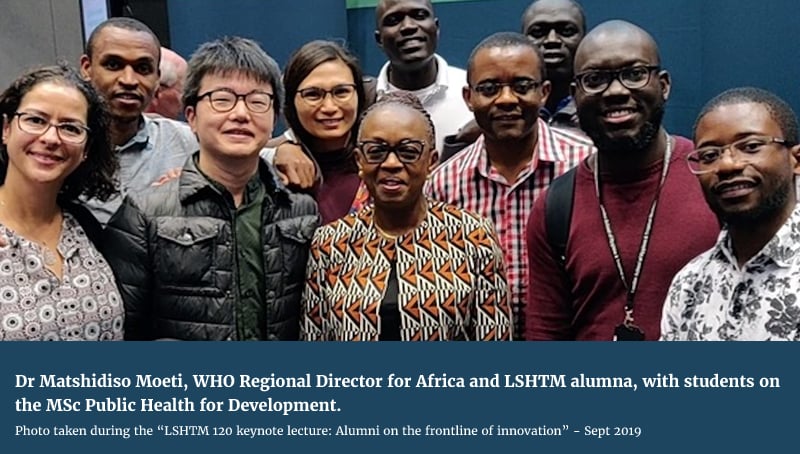Dive deeper into the world of public health, elevating your expertise to become a trailblazing leader in the field. Address critical healthcare challenges, from malaria to sexual health, and find groundbreaking solutions for underserved communities in low- and middle-income countries.
Studying our MSc Public Health for Global Practice, you’ll learn from a diverse range of specialists in health economics, statistics, epidemiology, social science, and health policies. Then explore how these can be applied to low- and middle- income settings. Considering health services from a multidisciplinary perspective, you’ll engage with complex health and development challenges and design and manage interventions to improve the outcomes. Your new skills will help you make a lasting impact in the most marginalised groups in the world.
What you will learn
- Grow in-depth knowledge of a range of current issues and topics related to public health in low- and middle-income settings
- Explore core public health disciplines including epidemiology, statistics, social science research, health economics and health policy
- Gain experience with quantitative and qualitative research methodologies, understanding their strengths and how to apply them globally
- Discover how to identify and assess health problems and evaluate actions designed to improve public health
- Develop appropriate strategies to manage and promote health, collaborating in a team and across disciplines
The aims and learning outcomes are detailed in the programme specification.
You’ll be taught by a team of social scientists, epidemiologists, maternal and birth health specialists, among many other experts, and benefit from 1:1 tailored advice and guidance over the course of the year. With a maximum of 40 international students in each cohort, who have very diverse backgrounds and experiences, you will also build on your professional knowledge as you hear first-hand experiences from other students.
We host a student seminar series in which you’ll look at key issues that shape the current global and health agenda, including weekly sessions where we discuss ideas and topics as a group. Our strong alumni network will be available to offer further support during the course and beyond.
With a wide range of modules available, you’ll begin by covering standard topics such as health systems and social research. You’ll then shape your studies with our elective modules, to suit your learning needs and career aims. Perhaps you’ll look at a public health module like design and disease control programmes? Or maybe you’re interested in a topic like nutrition or sexual health? Or how about a skills-based module like statistics or economic evaluation?
Your research project towards the end of the degree will give you an additional chance to examine a public health problem of your choice in more depth.
Who is it for?
From public health programme planners and health researchers to humanitarian relief workers and clinicians in conflict areas, students join this course from a wide range of academic and professional backgrounds. We’ve designed the content to be multidisciplinary, meaning you can hone your skills alongside each other.
You should be enthusiastic and keen to consolidate and develop your knowledge in public health – alongside a desire to apply new knowledge and skills in a low- and middle-income settings. You will already have some relevant work experience that can provide a basis for further learning.
Having built up skills in a range of key topics, you could open up exciting roles at organisations such as the United Nations, UNICEF, or the WHO. Or perhaps you’re considering an academic route, progressing to a higher research degree in your chosen public health specialism.
Duration
One year full time; part-time or split study over two years. Ways to study explained.
Public Health for Global Practice
Hear Programme Director Hannah Blencowe talk about the MSc Public Health for Global Practice (formerly known as Public Health for Development).

Neve Mattinson
MSc Public Health for Global Practice
The below structure outlines the proposed modules for this programme. Programme and module specifications provide full details about the aims and objectives of each module, what you will study and how the module is assessed.
- Structure of the year
- Term 1
Students take the following compulsory AB1 modules, which are assessed formatively during the term and form the basis of one of the final exam papers in the summer:
- Extended Epidemiology
- Health Policy, Process & Power
- Introduction to Health Economics
- Principles of Social Research
- Statistics for Epidemiology & Population Health
- Terms 2 and 3
Students take a total of five study modules, one from each timetable slot (C1, C2, D1, D2, E), working with personal tutors to identify a pathway through the programme which best serves their career. Students may choose to develop research skills in statistics and epidemiology; qualitative methods; health policy; or health economics. They may also choose to develop a specialist public health focus such as vector control; maternal and newborn health; sexual and reproductive health; or water, sanitation and health.
All students take the unifying module Applying Public Health Principles in the E slot. This module builds on the learning from Terms 1 and 2 so students apply public health disciplines to review evidence, produce policy recommendations, develop strategic public health programme plans and conduct strategic reviews.
C1 slot
- Designing Disease Control Programmes
- Economic Evaluation
- Health Care Evaluation
- Health Promotion Approaches and Methods
- Malaria: From Science to Policy and Practice
- Maternal & Child Nutrition
- Research Design & Analysis
- Sociological Approaches to Health
- Study Design: Writing a Study Proposal
C2 slot
- Alcohol, Tobacco and other Drugs
- Conflict and Health
- Design & Analysis of Epidemiological Studies
- Family Planning Programmes
- Health Systems
- History & Health
- Population, Poverty and Environment
- Qualitative Methodologies
- Statistical Methods in Epidemiology
D1 slot
- Control of Sexually Transmitted Infections
- Current Issues in Maternal & Perinatal Health
- Economic Analysis for Health Policy
- Epidemiology of Non-Communicable Diseases
- Evaluation of Public Health Interventions
- Medical Anthropology and Public Health
- Nutrition in Emergencies
- Organisational Management
- Social Epidemiology
- Spatial Epidemiology in Public Health
- Water, Sanitation and Hygiene, and Health
D2 slot
- Design & Evaluation of Mental Health Programmes
- Environmental Epidemiology
- Epidemiology of Infectious Diseases
- Ethics, Public Health & Human Rights
- Globalisation & Health
- Reviewing the Literature
- Sexual Health
E slot
- Applying Public Health Principles
- Field trip
The field trips, or retreats, are an integral part of the programme, where we introduce students to peer learning.
The first is a compulsory residential two-day retreat during the orientation period. Students spend one day on a rural walk and learn about one another's public health experience. On the second day they form groups based on common themes in public health, which may be based on geography, disease-specific or skill-specific such as delivery care, logistics or health promotion. These discussions form the basis of reflections and presentations at the Student Seminar Series.
During the second retreat after the summer examinations, students reflect in a structured way on their public health learning over the year and undertake a formal evaluation of the course.
There is an additional fee for students on the programme, which covers the cost of the retreats.
- Project report
During the summer months (June - August), students draw on all their academic skills by undertaking a project on a subject of importance to public health in a low- or middle-income country, for submission by early September. The project can take the form of a literature review, analysis of a data set, a policy report or a study protocol. The project is an independent piece of work, but students have contact with their supervisors who guide them in this work.
Changes to the programme
LSHTM will seek to deliver this programme in accordance with the description set out on this programme page. However, there may be situations in which it is desirable or necessary for LSHTM to make changes in course provision, either before or after registration. For further information, please see our page on changes to courses.
| Fees 2025/26 | ||
|---|---|---|
| Home | Full-time | £13,580 |
| Part-time | £6,790 | |
| EU/Overseas | Full-time | £29,960 |
| Part-time | £14,980 | |
| Field Trip | £280 |
*Mobile users, scroll right to view fees
Early application fee reduction for UK MSc students 2025-26
If you are a student from the UK (and have a home fee status), you will be eligible to receive a 5% reduction in your tuition fee if you submit your application by 23:59 on Friday 4 April 2025 and subsequently register onto one of our in-person MSc programmes (some exclusions apply, see detailed terms and conditions).
You must be applying for full-time study on a programme starting in September 2025; be funding your fees yourself; and be a new applicant.
If you meet the above criteria and submit your application by the deadline, you will automatically receive the tuition fee discount.
In order to be admitted to an LSHTM master's degree programme, an applicant must:
- hold either a first degree at Second Class Honours (2:2) standard in a relevant discipline, or a degree in medicine recognised by the UK General Medical Council (GMC) for the purposes of practising medicine in the UK, or another degree of equivalent standard awarded by an overseas institution recognised by UK ENIC or the GMC.
or
- hold a professional qualification appropriate to the programme of study to be followed obtained by written examinations and judged by LSHTM to be equivalent to a Second Class Honours (2:2) degree or above.
or
- have relevant professional experience or training which is judged by LSHTM to be equivalent to a Second Class Honours (2:2) degree or above.
If you have not previously studied in the UK, you can check our guide to international equivalent qualifications for our master's degrees.
Additionally for the MSc Public Health for Global Practice, successful applicants are expected to have one year’s professional experience in public health in a low- or middle-income country.
Applicants who do not meet the minimum entry requirement, but who have relevant professional experience may still be eligible for admission. Qualifications and experience will be assessed from the application.
English language requirements
If English is not your first language, you will need to meet these requirements: Band C
It is possible to apply without English language test results however the results of a test may be listed as a condition of an offer of admission. Please see our English language requirements for more information.
Intercalating students
You will need the equivalent of a bachelor's degree to undertake an MSc. This will usually require you to have a BSc degree or have completed the first three years of your medical degree. More information on intercalating an MSc at LSHTM.
Access and widening participation
At LSHTM we are committed to ensuring that excellent students feel encouraged to apply for a course of study with us. We have introduced an innovative contextual admissions system that is designed to support those students who have faced the greatest barriers to their learning. More information on widening participation at LSHTM.
Applications should be made online and will only be considered once you have provided all required information and supporting documentation.
Please also read LSHTM's Admissions policies (pdf) prior to submitting your application.
You can apply for up to two master's programmes. Make sure to list them by order of preference as consideration will be given to your top choice first.
Please ensure you pay careful attention to the content of your personal statement (page limit: 1 page). We do not invite applicants for interviews, so the clarity and relevance of the information you provide in your personal statement are of considerable importance to us. We would like to know your experiences in relevant fields(s), your reasons for applying to our MSc, what you hope to gain from the training we offer, and how you intend to use the knowledge and skills you acquired to further your career and contribute to improving health.
Application fee
A standard non-refundable application fee of £50 applies to all taught Master’s degree programmes and is payable upon application submission. Income generated from the application fee is shared between scholarships and the student hardship funds.
Application deadline
The final closing dates for all taught Master’s applications for entry in the 2025/26 academic year is:
- Sunday 27 July 2025 at 23:59 UK time for all students requiring a Student visa
- Sunday 31 August 2025 at 23:59 UK time for all UK, Irish and non-Student visa students
Tuition fee deposit
Applicants are required to respond to their Offer of Admission and pay the £500 deposit within 28 days of receipt, or their place will be released and the offer automatically declined. The deposit is deductible from tuition fees upon full registration with LSHTM. Applicants in receipt of a full scholarship will not be required to pay the deposit.
Do you need a visa?
Please visit our Visa & Immigration pages for advice and guidance.
Graduates from this programme work in global health, health service management, in health programmes in low-income countries, in NGOs, and in research.
Below you will find just a few of the positions and organisations that our graduates from this course have entered. Please note that this is a small, representative sample of the types of organisations and roles that graduates enter, and is not comprehensive.
- Example job titles
- Example organisations
- Action Against Hunger
- Heritage International
- InterHealth Worldwide
- International Committee of the Red Cross (ICRC)
- International Planned Parenthood Federation (IPPF)
- London School of Hygiene & Tropical Medicine
- Médecins Sans Frontières (Doctors Without Borders)
- National Institute for Medical Research
- Public Health England
- Research and Development Division, Ghana Health Service
- Save the Children
- The Latin American and Caribbean Sex Workers' Federation
- United Nations Development Programme (UNDP)
- World Food Programme
- World Health Organization
- World Vision
- Marie Stopes International



